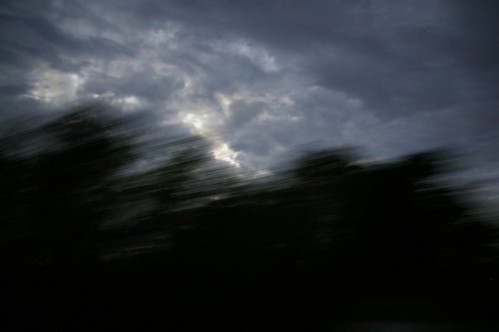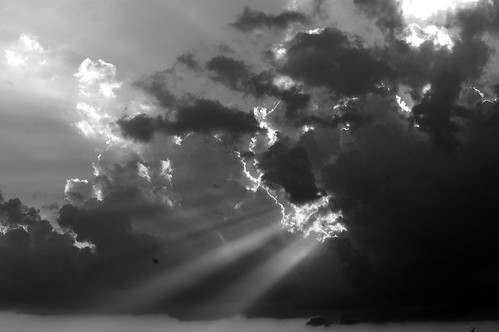The Dark is
Rising
Without wanting to be too terribly maudlin about it,
I've been reflecting a lot lately on the permanent and the
transitory. As a child, the walls of my world were a bastion of solid
permanencei.
We had always lived in that farmhouse by the creek and the woods. Mom
and dad had always been married. The dense forest and meadows of our
tiny landscape had always been forest and meadow. The old scratchy
sofa had, and always would be, our old scratchy sofa. None of these
things could change any more than the sun could drop out of the sky.
Even as the minor details of childhood life swirled around in the
constant sensory flux of a new world, those outer boundaries were
stone, unyielding. In that sense childhood is a paradox; a fragile,
constantly evolving thing that, at the same time, needs so
desperately to cling to the unmovable.
On a small enough time scale, most everything is
permanent.
Growing up, then, is not just the gradual loss of
fragility as we stack filters like walls between us and the sheer
sensory overload of the world. In equally paradoxical fashion, it's
also letting go of the illusion of permanence; learning to cope with
a constant cycle of creation and decay at all levels. My parents have
passed on. I have a new house and miss the meadows and forests. Our
new sofa will eventually wear out and be replaced. On the adult time
scale, nothing is permanent, and everything is
transitory...especially those sun-fallingly large things that were
the cardinal corners of our younger world.
This is not a new revelation for humanity. It's not
even a new revelation for me, but the older I get, and the more of
life is strung behind me, the more that inescapable cycle of
transition peels away layers, and I see a new piece of it, a new
facet, and I get a glimmer at least of a different understanding of
it. Our time here is not marked just by the inherent smallness of our
lifespan, but just that even within that time, everything is
fleeting. I think it puts us at odds with our basest instincts. We
don't want things to change. We want something to hold on to, to
build our home on solid earth. But in a sea of shifting sands, our
"mature" adult brain eventually realizes this isn't the
case. Somewhere in the middle of our base animal rage and our cool
intellectual acceptance is where most of us pitch our flimsy tents. I
guess that means really being at peace with life can only mean
accepting each bit in its own right. Enjoying things in their time,
even though you know those bits are floating, like autumn leaves in a
brook; small blazes of color that will pass one by one in the greater
swirl of the waterii. It's
not the endless happiness of our Madison avenue fantasies, nor is it
the nihilism of zen buddhism's void. If anything, things mean more
because they are both real and transitory at the same time.
Years ago, in college, in an inexplicable burst of
creativity (or a reasonable approximation thereof) I sat down and
jotted off a poem. I'm sure it was only half-realized at the time,
fueled with too much Yeats and angst and NY fall scenery and
unrequited lust for some damningly unobtainable coffee house
alternagirliii.
But as I was mowing my new lawn today, it came back to me, and I
found some bits of glimmer in its awkward and clumsy versesiv.
Just like everything else, I think the meaning of the things we make,
the words we put down, they can be just as fluid. So here's a look at
where I was a decade ago. And also where I am now, I suppose.
Leavesv
Racing, blows the growing gale
through hidden autumn's greying vale
of dancing boughs and shifting space,
as heralded o'ervi
the valley's face,
the western wind is rising.
Across our stippled, sun-swept plain
the gusts show naught but cold disdain,
as every creature, man and kin,
feel their passing cool the skin.
The western wind is raging.
Sturdy walls and fires warm
are built with care to thwart the storm.
Yet, even nearvii
the hearthstone's light,
we cannot long postpone the night.
The western wind is changingviii.
Dark seeps through cracks, comes under doors;
and bearing passion's new amours,
drives us wandering from our room
to seek our place in evening's womb.
The western wind is ebbing.
Storm asks no quarter, nor does give,
for things must change if things should live.
Mad chaos is our blustry bride,
our transient restix,
personified.
The western wind is laughing.
As the ether stills the course,
the storm departs in no remorse,
for wending ways lead on to day,
and morning's light allows no stay.
The western wind is fleeting.
Yet, even leaving, part remains;
the soft, ethereal refrains
that mark the passing wind's goodbye.
More like sidhex
dancing than a cry,
the western wind is singing.
Cloud Study
#14
Notes
iI
say “my” because I know not every childhood was like mine, for
all its angels and demons.
iiYes
I realize I completely failed at capturing what I meant there, and
ended up spewing out the prose equivalent of a Thomas Kinkaide
painting.
iiiAlso,
in grand tradition of poets, real and self-imagined, before me,
possibly also beer. And for those who may not have come of age in
the 90's, coffee house girls (before they sold out and became
corporatized “baristas”) were a magical, mythical creature that
occasionally one could approach but never quite grasp them, like
mist in the air. They were just short of the word for God on the
lips of all young angsty poetic college men of my generation. Which,
given the sensitive man movement of the time, was most of us. For
better and worse.
ivIn
my defense, it is more of an homage to Yeats style. Which, not in my
defense, is a way of saying I wrote like someone else because I
couldn't find a way to do it in my own voice. That being said, the
mimcry came from an innocent rather than jaded place, so it doesn't
bother me quite so much. I wrote what I new...which was wooded vales
and the first pangs of change and loss. I just happened to do it in
more of a pseudo-19the century lyrical romantic sort of way. Though
honestly, I'm not so sure that's a bad thing.
vLeaves/leaves..The
leaves, or he leaves. Fun with Homonyms!!
viYes,
“o'er” sounds incredibly archaic and pretentious and makes me
cringe. But in my defense again, it really does sound better than
“over” or anything else I could think to replace it with.
viiI
did change this from the archaic “midst” to “near”. Though
honestly, I'm not sure it has the same connotation. I really was
trying to create a sensory image of being enveloped in light, being
warm and safe and cradled in it. And the dark seeping in through the
cracks, spreading out its tendrils inside our safety.
viiiI
still like the endcap for each stanza, with “the western wind is
(X)”. But the middle ones don't make as much sense as the starting
and ending ones. I have it ebbing while I'm talking about storms,
etc. Need to redo that at some point.
ix
Another change I'm not happy with. Originally, “our fleeting stay,
personified”. Buyt I use “fleeting” in one of the next
stanzas, and I was trying not to repeat. Especially since it was
important to me where it was, marking a change in the “western
wind” snippets....all those before are actions...the western wind
is doing x, the western wind is doing y. This is a
description....the western wind is fleeting. An adjective, not a
verb. Not sure why I think it's poignant, but it is to me.
xAhh
Yeats and his sidhe. This is where the influence not just is
apparent, but slaps you in the face and says “HEY, IT's YEATS.
YEATS YEATS YEATS....did you get that this is like Yeats?”.



No comments:
Post a Comment